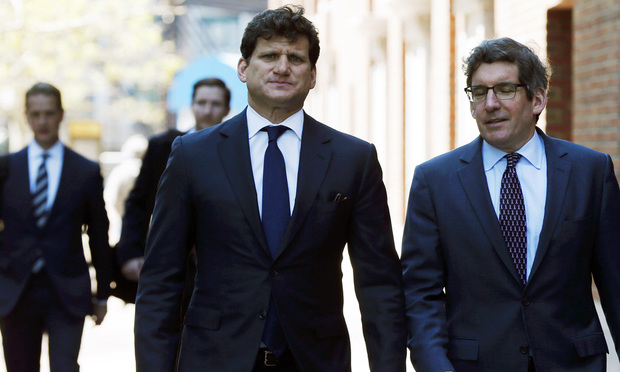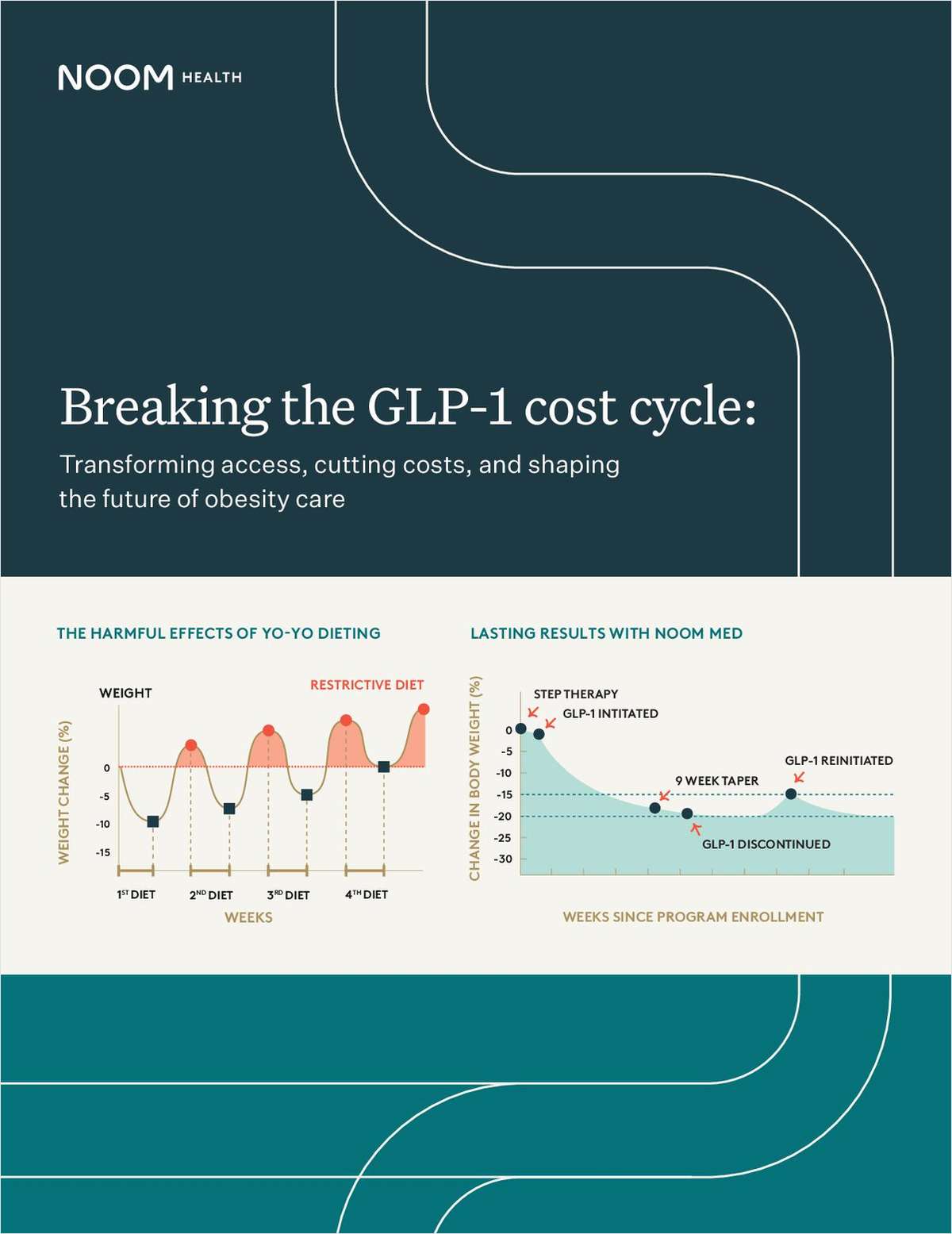Caplan Pleads Guilty in College Scandal, Could Face Eight Months Behind Bars
Caplan's guilty plea sets the stage for an Oct. 3 sentencing and disbarment proceedings in New York.
May 21, 2019 at 05:29 PM
3 minute read
The original version of this story was published on New York Law Journal
 Gordon Caplan, center, arrives at federal court Tuesday in Boston. (AP Photo/Michael Dwyer)
Gordon Caplan, center, arrives at federal court Tuesday in Boston. (AP Photo/Michael Dwyer)
Greenwich, Connecticut resident Gordon Caplan, the former co-chairman of Willkie Farr & Gallagher accused of paying a bribe to rig his daughter's ACT score, pleaded guilty in Boston federal court on Tuesday to a count of conspiracy. He faces a recommended sentence of eight months in prison.
The former law firm leader's guilty plea did not come as a surprise. Caplan on April 5 announced his intention to plead guilty. The details of his agreement with prosecutors were publicly filed a few days later.
Caplan was one of 12 parents who agreed to plead guilty to a single charge of conspiracy to commit mail fraud and honest services mail fraud as part of a large federal investigation into a college admissions scam.
Tuesday's proceedings, where Caplan was accompanied by his lawyer Joshua Levy of Ropes & Gray, resulted in a sentencing date being set for Oct. 3. The guilty plea also sets the stage for the New York courts to disbar Caplan. Disbarment is automatic on the conviction of a felony, as long as the criminal conduct would also have been a felony under New York state criminal law.
Prosecutors said Caplan paid $75,000 to crooked college admissions consultant William “Rick” Singer so that his daughter's ACT answers would be corrected after she took the test, resulting in her getting a higher score.
“My daughter had nothing to do with this,” Caplan said in court on Tuesday, according to news reports.
His statement last month said his daughter had no knowledge about his actions and was “devastated to learn what I did and has been hurt the most by it.” He added, “My immediate goal is to focus on making amends for my actions to try to win back the trust and respect of my daughter, my family, and my community. The remorse and shame that I feel is more than I can convey.”
A spokeswoman for Willkie declined to comment. While Caplan was initially placed on leave at the firm, Willkie last month announced he was “no longer a partner” after Caplan said he planned to plead guilty.
Under the terms of his plea deal, Caplan's offense level is 11, which results in a sentencing guidelines range of eight to 14 months for a first-time offender. Prosecutors agreed to recommend a sentence at the low end of that range, plus a year of supervised release and a $40,000 fine.
U.S. District Judge Indira Talwani will do her own calculations of the applicable guidelines, however.
San Francisco resident Agustin Huneeus also pleaded guilty on Tuesday, admitting to taking part in the exam-cheating scheme and a fraudulent athletic-recruitment plot that Singer helped organize. Prosecutors recommend a term of 15 months behind bars for him, and his sentencing is set for Oct. 4.
This content has been archived. It is available through our partners, LexisNexis® and Bloomberg Law.
To view this content, please continue to their sites.
Not a Lexis Subscriber?
Subscribe Now
Not a Bloomberg Law Subscriber?
Subscribe Now
NOT FOR REPRINT
© 2025 ALM Global, LLC, All Rights Reserved. Request academic re-use from www.copyright.com. All other uses, submit a request to [email protected]. For more information visit Asset & Logo Licensing.
You Might Like
View All



Federal Judge Approves Harvard's Dismissal of Chip-Patent Suit Against Samsung
2 minute readTrending Stories
- 1Uber Files RICO Suit Against Plaintiff-Side Firms Alleging Fraudulent Injury Claims
- 2The Law Firm Disrupted: Scrutinizing the Elephant More Than the Mouse
- 3Inherent Diminished Value Damages Unavailable to 3rd-Party Claimants, Court Says
- 4Pa. Defense Firm Sued by Client Over Ex-Eagles Player's $43.5M Med Mal Win
- 5Losses Mount at Morris Manning, but Departing Ex-Chair Stays Bullish About His Old Firm's Future
Who Got The Work
J. Brugh Lower of Gibbons has entered an appearance for industrial equipment supplier Devco Corporation in a pending trademark infringement lawsuit. The suit, accusing the defendant of selling knock-off Graco products, was filed Dec. 18 in New Jersey District Court by Rivkin Radler on behalf of Graco Inc. and Graco Minnesota. The case, assigned to U.S. District Judge Zahid N. Quraishi, is 3:24-cv-11294, Graco Inc. et al v. Devco Corporation.
Who Got The Work
Rebecca Maller-Stein and Kent A. Yalowitz of Arnold & Porter Kaye Scholer have entered their appearances for Hanaco Venture Capital and its executives, Lior Prosor and David Frankel, in a pending securities lawsuit. The action, filed on Dec. 24 in New York Southern District Court by Zell, Aron & Co. on behalf of Goldeneye Advisors, accuses the defendants of negligently and fraudulently managing the plaintiff's $1 million investment. The case, assigned to U.S. District Judge Vernon S. Broderick, is 1:24-cv-09918, Goldeneye Advisors, LLC v. Hanaco Venture Capital, Ltd. et al.
Who Got The Work
Attorneys from A&O Shearman has stepped in as defense counsel for Toronto-Dominion Bank and other defendants in a pending securities class action. The suit, filed Dec. 11 in New York Southern District Court by Bleichmar Fonti & Auld, accuses the defendants of concealing the bank's 'pervasive' deficiencies in regards to its compliance with the Bank Secrecy Act and the quality of its anti-money laundering controls. The case, assigned to U.S. District Judge Arun Subramanian, is 1:24-cv-09445, Gonzalez v. The Toronto-Dominion Bank et al.
Who Got The Work
Crown Castle International, a Pennsylvania company providing shared communications infrastructure, has turned to Luke D. Wolf of Gordon Rees Scully Mansukhani to fend off a pending breach-of-contract lawsuit. The court action, filed Nov. 25 in Michigan Eastern District Court by Hooper Hathaway PC on behalf of The Town Residences LLC, accuses Crown Castle of failing to transfer approximately $30,000 in utility payments from T-Mobile in breach of a roof-top lease and assignment agreement. The case, assigned to U.S. District Judge Susan K. Declercq, is 2:24-cv-13131, The Town Residences LLC v. T-Mobile US, Inc. et al.
Who Got The Work
Wilfred P. Coronato and Daniel M. Schwartz of McCarter & English have stepped in as defense counsel to Electrolux Home Products Inc. in a pending product liability lawsuit. The court action, filed Nov. 26 in New York Eastern District Court by Poulos Lopiccolo PC and Nagel Rice LLP on behalf of David Stern, alleges that the defendant's refrigerators’ drawers and shelving repeatedly break and fall apart within months after purchase. The case, assigned to U.S. District Judge Joan M. Azrack, is 2:24-cv-08204, Stern v. Electrolux Home Products, Inc.
Featured Firms
Law Offices of Gary Martin Hays & Associates, P.C.
(470) 294-1674
Law Offices of Mark E. Salomone
(857) 444-6468
Smith & Hassler
(713) 739-1250










